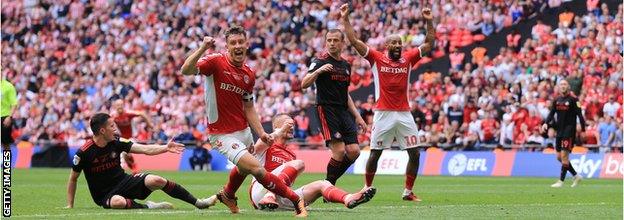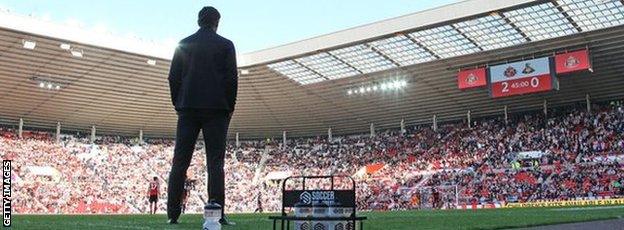Sunderland: Jack Ross on Netflix, promotion & his legacy
- Published
'I don't fear the sack' - Sunderland manager Ross
"I've never lived in fear of the sack in any of my jobs as a manager. I live in fear of not doing the job properly."
As the corridors of Sunderland's Academy of Light hum with the steady buzz of activity, manager Jack Ross is a picture of contentment almost unbefitting of someone with his job title.
After all, he is in a unique position at this time of year for someone leading this footballing behemoth - he is still in his post. Nine head coaches have come and gone since Steve Bruce last achieved the feat, with Ross the first boss of this troubled League One giant to start consecutive seasons for eight years.
Back-to-back relegations, a crippling financial wrangle with a departing owner, and a blockbuster Netflix series documenting it all provided the pre-cursor for Ross, the man who had just guided St Mirren back to the top flight in Scottish football.
Now 12 months into the job and having suffered the heartache of play-off defeat with the last kick of the season, the 43-year-old talks to BBC Scotland about "gut-wrenching" pain, driving home with camera crews, being answerable to the cleaner and his hopes for his legacy at the club.
Sunderland tattoos & Richie the cleaner
The clock at the end of the room ticks around to 3pm. Outside the broad window overlooking two of the 13 pristine pitches, the training ground car park begins to empty with a steady trickle of sparkling 4x4s, the din through the complex's walls softening as the football staff dissipate slowly. Still, Ross' day is only halfway through.
After arriving first thing that morning, he has already conducted two news conferences, carried out his coaching duties, had at least one meeting and was preparing to go to a game at night. It is a typical day for a man who has thrown himself into the task of returning Sunderland to the top echelon of English football.
"I come in at 7.20am and the first person I bump into is Richie, one of the cleaners. Every single morning we'll speak and he's a diehard Sunderland fan. He has Sunderland badges tattooed on both his legs and he'll give me stick sometimes about the result, but we'll have a bit of banter about it.
"That doesn't change whether I win or lose on the Saturday. Because the respect I have for him and the job he does at the club is there. We've worked hard at that and broken down a lot of barriers in that respect. If I was to leave here tomorrow, I'd hope the person coming in at the back of me would pick something up that was good in that sense."
'I had no question I did my job properly'

Sunderland conceded a 94th-minute winner against Charlton in May's play-off final
As well as building bridges off the pitch, Ross had to construct a team capable of winning on it. Picking up after Chris Coleman's exit, he took Sunderland to within touching distance of promotion, only to miss out due to a 94th-minute Charlton Athletic goal in the play-off final at Wembley.
He acknowledges the raw pain felt by all at the club but, despite the precarious lives of his short-lived predecessors, refuses to succumb to the notion that his own future clouded his thoughts in the immediate aftermath.
"I am probably my own biggest critic, so it hurt me not to achieve what I wanted to. It was gut-wrenching," he says. "But in terms of what I put into the job and how diligent and thorough I was, I had no question I had done that properly. Thereafter if the decision is made to relieve you of your duties I feel it's important to look yourself in the mirror properly and believe you did as much as you can."
Ross nods to the advice and support given not just in those difficult days in May following Wembley, but throughout the campaign from the likes of Leicester City manager Brendan Rodgers and Aberdeen counterpart Derek McInnes.
"At times you get little nuggets that help you," he added. "I spoke openly about how supportive Brendan was and I spoke to him early in my time here as well. And Derek was always very good to me in Scotland, going back to when I was Alloa manager. He sent me a message in the aftermath of the play-off game. Without going into detail, it was from someone who had been through that pain in being very close to achieving success."
Netflix cameras in his car
In December last year, Sunderland Til I Die was broadcast on Netflix. A fly-on-the-wall documentary cataloguing the club's catastrophic descent through the Championship into League One, the eight-episode series was such a hit that a second was commissioned for Ross' first season at the Stadium of Light.
He acknowledges that it wasn't the most enjoyable part of his first 12 months in the North East.
"Purely as a football manager, I said I'd prefer not to have it. We didn't want any more distractions," he says. "I would never grant dressing room access as I felt it would dilute the message I was trying to get across to the players, but there was a certain amount of onus on me as a manager to help them. I had a television crew in my car driving home with me at nights. Whether that gets used or not I don't know..."
Ross was allowed a preview of the show when he first joined the club, and admits to having his eyes opened to his new reality.
"I was shown a little bit of the incident when Chris [Coleman] was leaving the ground after the club was relegated and he got a bit of stick," said Ross, putting it mildly. "I'm not quite sure why they chose to show me that clip to give me an incentive to be involved in it!
"But by the time the programme came around and I saw the episodes I was fully aware of the magnitude of the club and the expectancy of the supporters."
'We have made major strides here'

Jack Ross' Sunderland side were hobbled by too many draws last season as they finished fifth
For all Ross has enjoyed a rapid ascent in his managerial career, his dedication to his craft and understanding of the commitments his post carries are not lost on him.
It was just under three years ago the former Falkirk defender took charge of Alloa for the last time in 4-2 Challenge Cup win over Bala Town in front of 591 people. Now, the weighty responsibility of hoisting an entire city not just into the Championship, but ultimately the Premier League rests on his shoulders.
As Thursday afternoon slowly slips away and the last few cars pull out of the car park, Ross pauses as he ponders one final question.
"My legacy here? Usually as a manager you are judged on how many games you've won, have you brought promotion to the club or kept them into the league," he says. "That has to be a gauge. But I mentioned earlier about being proud of the job we've done in terms of readdressing the culture here and bringing it back to what it should be like.
"This club needs this environment and this atmosphere around it. I would hope already we have made major strides in that sense. Ultimately if I judge myself to be successful it will be if I can deliver promotion. And beyond that promotion again."